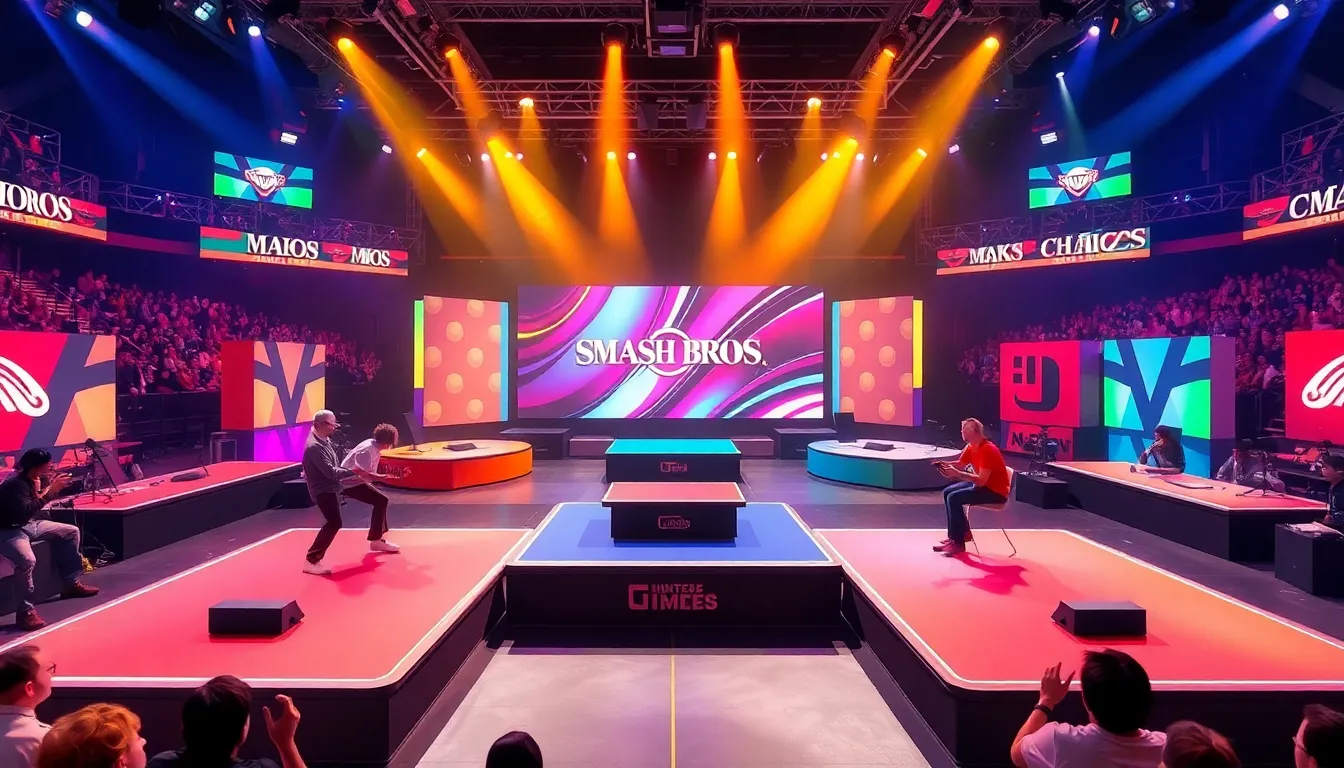Table of Contents
ToggleIn the chaotic world of Super Smash Bros, choosing the right stage can feel like picking a favorite child—everyone’s got an opinion, and no one agrees! With a plethora of stages to choose from, understanding stage legality is crucial for both casual players and competitive warriors. After all, nobody wants to be that guy who picks a stage that’s basically a glorified trampoline.
Overview of Smash Bros Stage Legality
Stage legality in Super Smash Bros affects gameplay dynamics for competitive matches. Various organizations and communities define rules that determine which stages players can select during tournaments. Understanding these regulations ensures fair competition, enhancing the overall experience.
Commonly accepted legal stages often exhibit balanced layouts and minimal hazards. For example, stages like Final Destination and Battlefield consistently appear in tournament settings, known for their neutrality. Conversely, stages such as Big Battlefield or hazards-rich environments like Wrecking Crew might be classified as non-legal due to imbalance in gameplay.
Organizing bodies, including the Smash World Tour and EVO, provide tournament guidelines detailing legal stages. These institutions frequently update rules, reflecting community feedback and game patches. Players must stay informed regarding current stage legality to avoid accidentally selecting non-compliant stages.
Many regions adopt their own rules, which can vary. Players competing in local tournaments may encounter different legal stage lists compared to major events. Clearly defining which stages are permitted can help prevent disputes during matches.
Evaluating stage legality affects both strategy and player skill. High-level players often develop specific strategies tailored to the nuances of legal stages. Notably, familiarity with stage layouts, platform placements, and potential recovery routes plays a critical role in enhancing competitive play.
Stage legality shapes competitive environments in Smash Bros. Being aware of which stages are legal not only impacts player performance but also contributes to a balanced and fair competitive landscape.
Factors Affecting Stage Legality

Stage legality hinges on several key factors that influence both the competitive nature of matches and player experience. Understanding these elements is essential for players navigating the tournament landscape.
Competitive Balance
Competitive balance refers to how fair and equal the stages are for all players. Balanced stages promote equal chances for each player to win, regardless of character choice. Final Destination and Battlefield exemplify this balance with consistent layouts and minimal hazards. In contrast, stages with unique features or significant hazards can disrupt this balance, giving certain characters distinct advantages. Stages like Wrecking Crew may introduce unintentional elements that favor specific strategies over others. Tournament organizers strive to select stages ensuring that skill, strategy, and player adaptability determine match outcomes, minimizing randomness.
Accessibility for Players
Accessibility for players concerns how easy it is to understand and navigate each stage. Players benefit from familiar designs and layouts that do not confuse or hinder gameplay. Stages with complicated mechanics may frustrate participants and detract from their competitive performance. Consequently, popular stages include simple platforms and predictable terrain, allowing players to focus on skill rather than stage navigation. Moreover, it’s crucial for tournament rules to consider players of varying skill levels, enabling broader participation. A stage that promotes accessibility enhances the overall tournament experience, making competition more enjoyable and engaging.
Popular Stages in Competitive Play
Stage selection plays a significant role in competitive Super Smash Bros matches. Understanding the legality of these stages helps players strategize effectively.
Final Destination
Final Destination stands out as one of the most popular legal stages in competitive play. Its flat surface and lack of platforms provide uniformity, ensuring all characters have equal opportunity for offensive and defensive maneuvers. Players appreciate its simplicity, which minimizes environmental distractions. Additionally, the absence of hazards allows for a focus on skillful gameplay and character matchups. Tournament organizations widely recognize Final Destination as a staple stage, often serving as the neutral ground for important matches. Achieving victory on this stage requires precise movement and timing, with every player focusing on expertly executed combos.
Battlefield
Battlefield is equally prominent in competitive play, celebrated for its balanced design. Three platforms positioned above the stage offer diverse strategies for both land and aerial combat. Players often utilize the platforms to extend combos and maintain advantageous positioning. The stage’s layout encourages defensive play, where characters can safely retreat or ambush opponents. Various tournament rulesets categorize Battlefield as a legal stage due to its competitive integrity. Establishing a winning strategy here involves mastering the platform mechanics and adapting to each character’s unique abilities.
Smashville
Smashville features a single moving platform, adding a dynamic element to competitive matches. This platform creates opportunities for characters to employ unique strategies, enhancing the gameplay experience. Players leverage the platform’s movement to control space and create advantageous situations. Often chosen for its balance, Smashville is included in many tournament legal stage lists. As the platform shifts during matches, adaptability becomes key. Mastering stage positioning and timing enhances a player’s ability to capitalize on the platform’s movement, ensuring competitive play remains engaging and unpredictable.
Controversial Stages
Certain stages in Super Smash Bros spark debate about their legality in competitive play. Players often express differing opinions on how these stages influence match outcomes.
Dream Land
Dream Land, a classic stage, features a unique design that raises concerns among competitive players. Its platforms have variable heights, providing potential advantages to mobile characters while complicating attacks for others. While some players appreciate the nostalgic elements, others argue that hit detection issues can lead to unfair edge cases. In competitive circles, this stage may fall into a limbo of legality, depending on local rules and community preferences. Decision-making often relies on understanding its impact on character matchups and stage interactions rather than a universal agreement on its viability.
Lylat Cruise
Lylat Cruise presents another point of contention due to its dynamic layout and angled platforms. These angles create unexpected situations that can disrupt standard gameplay strategies. Some players find the stage’s shifting nature offers exciting challenges, promoting adaptability in matches. Others, however, criticize the inconsistent stage mechanics, asserting that they can lead to unintentional self-destructs. This has prompted various tournament organizers to reconsider its inclusion in legal stage lists. The stage often emphasizes the need for ongoing discussion in the community about what maintains competitive integrity and ensures fair play.
Navigating the complexities of stage legality in Super Smash Bros is essential for players aiming to enhance their competitive edge. Understanding the nuances of stage selection can significantly impact gameplay dynamics and strategies. By staying informed about the legal stages recognized by various tournament organizations, players can ensure a fair and balanced playing field.
The ongoing discussions surrounding controversial stages underscore the importance of community input in shaping regulations. As players continue to engage with the evolving landscape of competitive play, embracing the principles of competitive balance and accessibility will ultimately lead to a richer gaming experience. Prioritizing stage legality not only fosters fairness but also elevates the overall skill level within the Smash Bros community.




